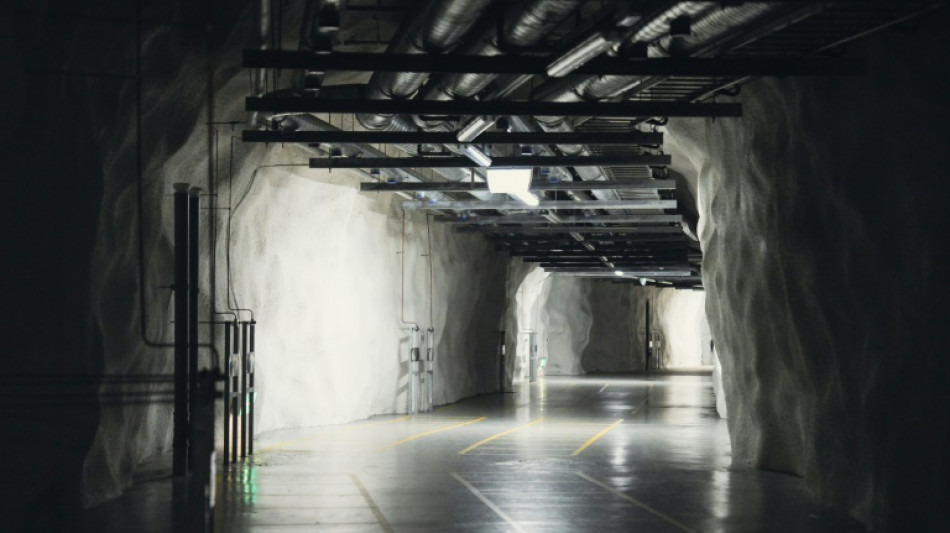
-
 NFL Cowboys top Giants in overtime while Lions maul Bears
NFL Cowboys top Giants in overtime while Lions maul Bears
-
Trump concerned S. Korean arrests could 'frighten' investors

-
 Timeless Modric opens AC Milan account with winner against Bologna
Timeless Modric opens AC Milan account with winner against Bologna
-
Spring quick-fire hat-trick helps Racing stun Bordeaux-Begles

-
 Macau's first 'patriots' election sees low turnout
Macau's first 'patriots' election sees low turnout
-
Prince Harry says has 'clear conscience' over explosive memoir

-
 Modric opens AC Milan account with winner against Bologna
Modric opens AC Milan account with winner against Bologna
-
Schroeder seals Euro basketball title for world champions Germany

-
 Hull wins LPGA Queen City title after Jeeno four-putt bogey at 18
Hull wins LPGA Queen City title after Jeeno four-putt bogey at 18
-
Spain's political class spars over chaotic Vuelta finale

-
 Top four into Women's Rugby World Cup semi-finals as France edge Ireland
Top four into Women's Rugby World Cup semi-finals as France edge Ireland
-
Two ships set sail from Greece to join Gaza aid flotilla

-
 Amorim won't change despite 'suffering' in dismal Man Utd run
Amorim won't change despite 'suffering' in dismal Man Utd run
-
Australia stunned by Belgium, joining USA on Davis Cup scrapheap

-
 Spinners power India to win over Pakistan in Asia Cup
Spinners power India to win over Pakistan in Asia Cup
-
Bolsonaro conviction 'not a witch hunt,' Lula tells Trump in NYT op-ed

-
 'Demon Slayer' tops N.America box office with record anime opening
'Demon Slayer' tops N.America box office with record anime opening
-
Tens of thousands join Ankara protest ahead of court showdown
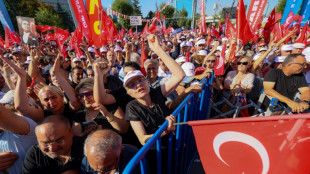
-
 Haaland-inspired Man City inflict derby demolition on Man Utd
Haaland-inspired Man City inflict derby demolition on Man Utd
-
Vuelta triumph caps Vingegaard's fight back from the brink

-
 French runner Gressier thanks anti-doping body for his world title
French runner Gressier thanks anti-doping body for his world title
-
Romania summons Russian ambassador over drone 'threat'
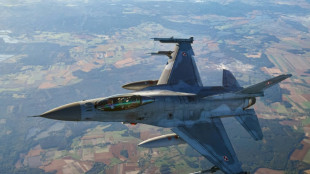
-
 'Palestine wins the Vuelta': Gaza demo halts cycling finale in Madrid
'Palestine wins the Vuelta': Gaza demo halts cycling finale in Madrid
-
Vuelta final stage abandoned due to pro-Palestinian protest, Vingegaard crowned

-
 PSG maintain perfect start to Ligue 1, Ethan Mbappe strikes late for Lille
PSG maintain perfect start to Ligue 1, Ethan Mbappe strikes late for Lille
-
Alleged Kirk killer had 'leftist' beliefs, Utah governor says

-
 Shakespeare family tragedy 'Hamnet' wins top Toronto film prize
Shakespeare family tragedy 'Hamnet' wins top Toronto film prize
-
Record-breaking England crush Scotland to reach Women's Rugby World Cup semi-finals

-
 Noren upstages Ryder Cup stars to win PGA Championship at Wentworth
Noren upstages Ryder Cup stars to win PGA Championship at Wentworth
-
Lookman to miss Atalanta's Champions League opener at PSG, says Juric

-
 Fraser-Pryce, Jamaica's sprint warrior queen
Fraser-Pryce, Jamaica's sprint warrior queen
-
Vuelta final stage abandoned amid huge pro-Palestinian protest

-
 India limit Pakistan to 127-9 in key Asia Cup T20 clash
India limit Pakistan to 127-9 in key Asia Cup T20 clash
-
Ethan Mbappe strikes late to give Lille win over Toulouse

-
 Fans set aside boycott calls to watch India-Pakistan cricket clash
Fans set aside boycott calls to watch India-Pakistan cricket clash
-
Rain denies England and South Africa a series decider
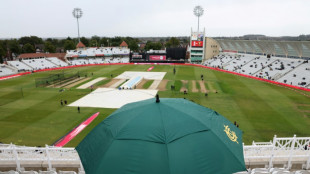
-
 Seville and Jefferson-Wooden enjoy maiden world titles, US savour field of gold
Seville and Jefferson-Wooden enjoy maiden world titles, US savour field of gold
-
Itoje to rehab with England as Farrell omitted from training squad

-
 Marc Marquez rolls out Messi-inspired celebration as seventh MotoGP title looms
Marc Marquez rolls out Messi-inspired celebration as seventh MotoGP title looms
-
Seville delighted to win world 100m title in front of Bolt

-
 Seville sparks Jamaican men's sprint renaissance
Seville sparks Jamaican men's sprint renaissance
-
Starmer says UK won't tolerate racial intimidation after far-right rally
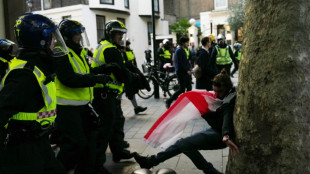
-
 New round of US-China trade talks kicks off in Madrid
New round of US-China trade talks kicks off in Madrid
-
France edge Ireland in Women's Rugby World Cup quarter-final thriller

-
 Seville wins Tokyo 100m for first Jamaican men's sprint title in 10 years
Seville wins Tokyo 100m for first Jamaican men's sprint title in 10 years
-
Marc Marquez nears seventh MotoGP title after San Marino triumph

-
 Jefferson-Wooden surges to women's 100 metres world title
Jefferson-Wooden surges to women's 100 metres world title
-
Former boxing world champion Hatton dies at 46

-
 Seville wins Tokyo 100m for first Jamaican sprint title in 10 years
Seville wins Tokyo 100m for first Jamaican sprint title in 10 years
-
France's Gressier shocks field to win world 10,000m gold


Finland's colossal bomb shelters a model for jittery Europe
Swimming pools, playgrounds and amusement parks: Finland's underground facilities, which can double as bomb shelters, have emerged as an inspiring approach as Europe ramps up preparedness after Russia's invasion of Ukraine.
Finland shares a 1,340-kilometre (830-mile) border with Russia. Its network of civil defence shelters is an integral part of its preparedness strategy, which harks back to just before World War II.
Blasted into Helsinki's granodiorite bedrock dozens of metres underground, people of all ages swim and splash in the pools or relax in saunas in the cavernous Itakeskus swimming hall.
The complex is one of Finland's 50,500 civil defence shelters which have space for around 4.8 million of its 5.6 million population.
Intended to accommodate up to 3,800 people, the pools can be emptied of water and turned into a bombproof shelter within 72 hours.
"This is the world's biggest civil defence shelter facilitating a swimming hall," Teemu Raatikainen, who has been the head of maintenance for almost 30 years, proudly explained as he gave AFP a tour.
Finland's security strategy based on long-term investments in both the military and preparedness -- including civil defence shelters -- has attracted international interest after Russia's invasion of Ukraine in 2022 and the deteriorated security situation across Europe.
"We always have this multi-use -- peacetime use and wartime use -- of our shelters," Jarkko Hayrinen, a senior rescue officer at Finland's interior ministry explained, as he showed AFP another one of Helsinki's large bomb shelters.
- Blast-proof tunnels -
With space for 6,000 people, the Merihaka shelter in central Helsinki houses an underground playground, several ball courts and a gym.
"The shelters are very well maintained because people are using them in normal times," Hayrinen said.
The Finnish "cultural mindset" of involving all sectors of society in security has become something of a "trademark" for Finland after it joined the NATO military alliance in 2023, said Matti Pesu, a senior researcher at the Finnish Institute of International Affairs.
"And the civil defence shelters are a real tangible symbol of how the authorities are preparing to protect citizens in emergency situations," he added.
High-level guests such as Ukrainian President Volodymyr Zelensky and Denmark's King Frederik X and Queen Mary have recently been given guided tours through the zigzagging blast-proof tunnels of the Merihaka shelter.
- Long tradition -
"The first act on building defence shelters was adopted already in 1939, two weeks before the Winter War started," Hayrinen said, referring to the Soviet Union's invasion of Finland which lasted more than a 100 days.
"Finland was not prepared for defending civilians during wartime and it was a hard lesson for us," he added.
The Nordic country now has bomb shelters to protect almost all its citizens, with Helsinki providing space for 900,000 persons -- enough to host all the capital's residents and thousands more.
Designed to withstand explosions, building collapses, radiation and toxic substances, the largest public shelters in Finland have primarily been situated in populated areas.
Buildings or housing complexes with a floor area exceeding 1,200 square metres are required by law to have a bomb shelter.
Other countries with a similar wide access to bunkers are Switzerland, Sweden, Norway and Israel.
"All of these countries are united by a tradition of neutrality or a strategically difficult position," Pesu noted.
Finland, where military service is mandatory for all men and voluntary for women, can quickly mobilise some 280,000 soldiers and the total military reserve comprises some 900,000 people.
On April 1, the country announced it will increase national defence spending to at least three percent of GDP by 2029 in response to the security threat posed by Russia.
T.Egger--VB


